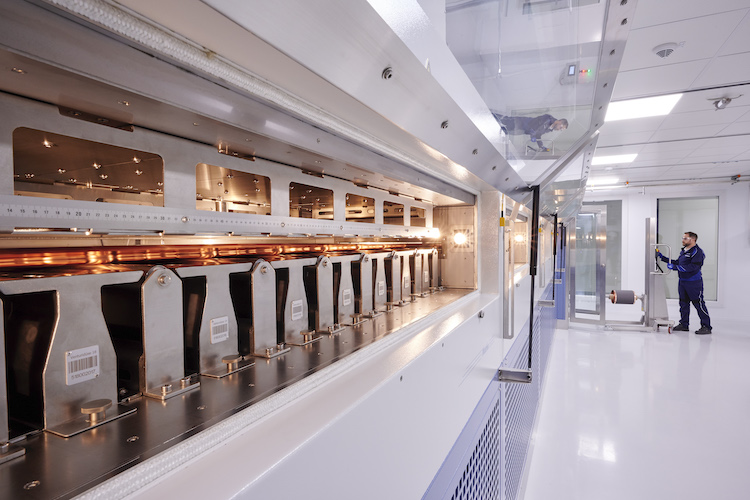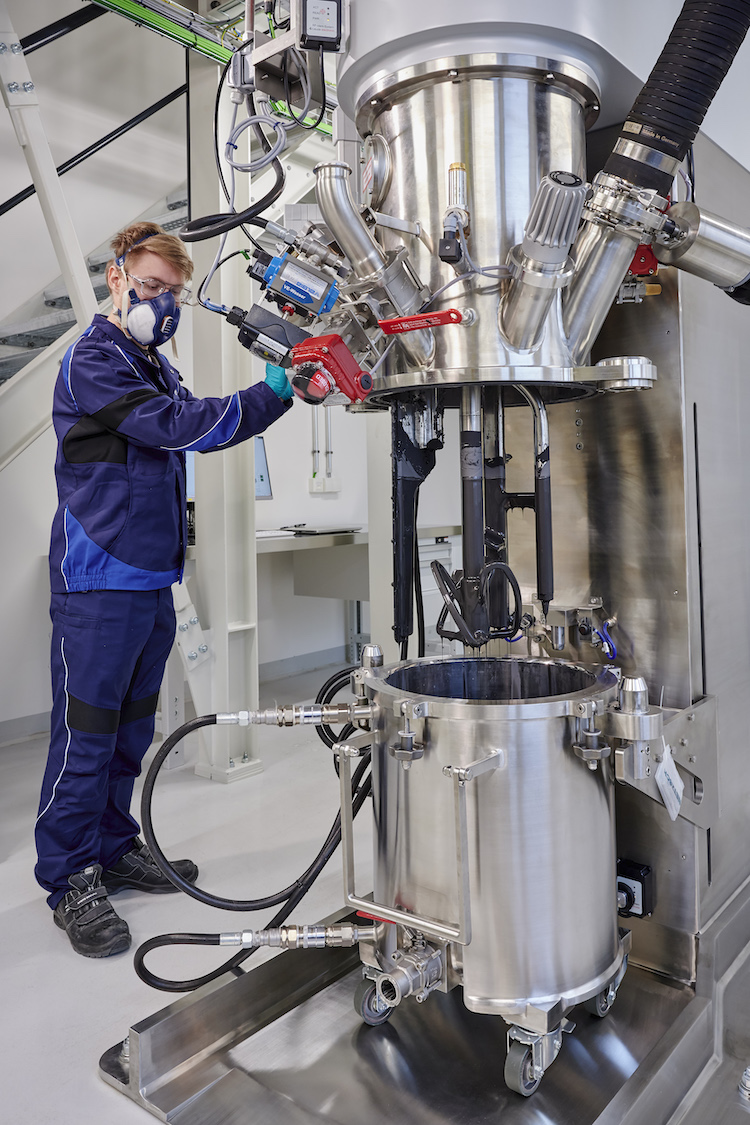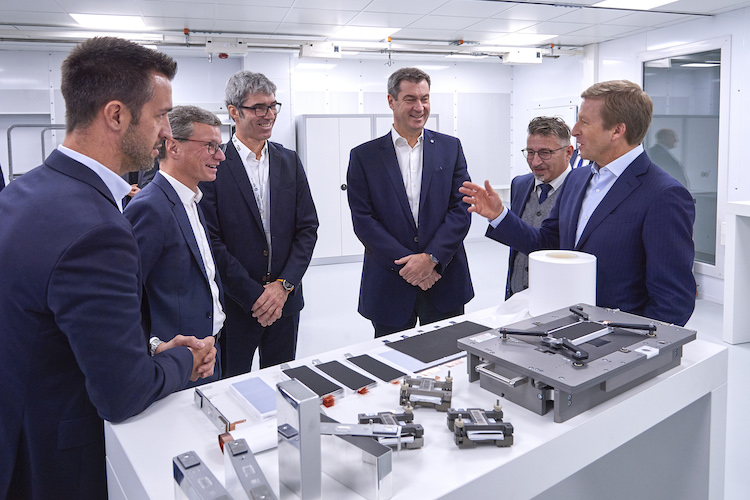BMW bids to shape the future of battery cell technology
The BMW Group is building on its leading position in the world of electric mobility and has pooled its many years of experience with battery cells and extensive knowledge in the field in a new Competence Centre.
The purpose of the facility in Munich is to advance battery cell technology and carefully dissect the production processes.
Oliver Zipse, chairman of the board of management of BMW, says: “The new Battery Cell Competence Centre puts us in an enviable position.
“Taking the technology currently in the BMW i3 as a basis, by 2030 we will be able to double the energy density of our battery cells – and therefore also the operating range of the vehicles for our customers.”
The BMW Group has presented its new high-tech Competence Centre to media representatives from around the world in the presence of Bavarian state premier Dr Markus Söder, revealing state-of-the-art labs, research facilities and prototype systems.

And Zipse says: “Battery cell technology is a key success factor in our electric vehicle offensive, as it influences both operational performance and battery costs.
“Our unrivalled expertise throughout the value chain ensures we are always at the cutting edge of technology. We can specify the exact formats we want to procure, as well as the materials and the conditions involved.
“As a result, we are ideally positioned to drive forward the rollout of our electrified vehicles.”
The new Competence Centre maps the entire value chain of battery cell technology – from research and development to a cell’s composition and design, and its suitability for large-scale manufacture.
The facility brings together the full breadth of the company’s expertise and lays the foundations for adding to it. The short distances and cross-functional collaboration at work here will enable complete, transparent and sustainable development of battery cells.
Here, it is important that consideration is given to the issue of recycling from the outset.
The BMW Group is investing a total of € 200 million in the Competence Centre and employees 200 people here. With this investment, the company is making a statement technologically but also safeguarding jobs and key skills.
The company is working together with its employees to define the future of electric mobility at the BMW Group.
Stefan Schmid, deputy chairman of the joint works council at BMW, says: “The Joint Works Council has been committed to the Battery Cell Competence Centre from the outset.
“The employee representatives at the BMW Group are actively involved in shaping these future-focused areas of the automotive industry, with the aim of developing the specific expertise of our employees within the company – and in so doing securing jobs for the long term during the process of transformation.”
Materials development at the root of cell development
The BMW Group is developing future generations of battery cells at the new Competence Centre, focusing on customer-relevant aspects, such as improving energy density, available peak output, service life, safety, charging characteristics and performance at varying temperatures, and reducing battery costs.
The BMW Group’s aim of developing the best battery cells for its models was formulated with these specifications at the forefront, reflecting the company’s commitment to giving electrified vehicle owners the very best cells for the vehicle concept at hand.
Selecting the right materials from the beginning is crucial if these high standards are to be met. For this reason, the experts at the Competence Centre are constantly investigating innovative materials and systematically comparing them with one another.
This leads to the creation of new material sets for the battery cell’s individual elements: the anode, cathode, electrolyte and separator.
The way in which the various materials interact – the cell chemistry, in other words – is another fundamental factor in the evolution of the cell design.
To guarantee access to the latest developments and knowledge at all times, the BMW Group works together with renowned worldwide partners throughout the value chain.
These partners range from scientific institutions and universities to established companies and start-ups. And that enables the company to acquire know-how, ensures it is not dependent on individual developments and means it can create synergies and ultimately shorten development times.
Working with a network of partners allows the BMW Group to consolidate its in-depth understanding of this cutting-edge technology and exploit the potential and opportunities of future innovations.

Cutting-edge laboratory and analytical equipment
Experts from around the world in the new development laboratories and facilities are striving to enhance the chemical composition and design of battery cells. Simulation and chemical analysis are assisting cell development from the word go.
The BMW Group has been analysing battery cells since 2008, allowing it to draw on many years of experience and, as a result, extensive expertise in the field.
The laboratory at the new Competence Centre boasts the state-of-the-art technology and methodology needed to further expand the company’s knowledge, monitor trends for the battery cells of the future and play an active role in shaping developments.
The laboratory has been producing internally developed test cells in small formats for some years already with the aim of identifying the ideal cell structure from the myriad materials and variants.
Great value is placed here on minimising the quantities of material used while optimising their properties. If a cell passes the initial durability and charging behaviour tests, it is subjected to further testing in a larger format.
An entire testing hall is on hand for this purpose and enables a wide variety of test types.
The experts are also able to make use of an in-house safety lab, where the battery cells’ robustness can be investigated under extreme conditions.
In this way, the BMW Group is able to maintain the same high standards of safety despite increasing energy densities and faster charging capabilities.
A sustainable and reliable supply path until 2025 and beyond
Sustainability and supply reliability are key factors in the ongoing expansion of electric mobility.
For the BMW Group’s procurement specialists, ethical production and processing of raw materials begins at the very start of the value chain, which is why they closely scrutinise the battery cell supply chains – all the way back to the mines from which the materials are sourced. Complying with environmental standards and respecting human rights take top priority.
The company has also restructured its supply chains for the upcoming fifth generation of high-voltage batteries and will begin direct procurement of cobalt and lithium for battery cells in 2020.
This ensures complete transparency regarding the origin of these two vital raw materials for batteries. Added to which, the relevant agreements guarantee a reliable supply of these materials until 2025 and beyond.
In future, cobalt will be sourced directly from mines in Australia and Morocco, and lithium from countries including Australia.

Manufacturing technology of the future
The BMW Group is also taking steps to ensure that future generations of battery cells can be manufactured on a large scale. The Competence Centre offers both ideal overall conditions and high-quality production facilities conforming to the industry standards of established cell manufacturers.
New production technologies have been integrated here, bearing in mind the importance of flexibility with cell format in order to create greater scope for incorporating different developments.
Manufacturing battery cell prototypes enables full analysis and understanding of the value chain processes for the cells. Adding the BMW Group’s in-house production expertise to the equation means the company can commission a specific chemical composition, mechanism and design for battery cells.
In future, the BMW Group will be in a position to enable potential suppliers to manufacture cells in accordance with its particular requirements.
Recycling-friendly design
Batteries that are no longer fit for vehicles can be reused in stationary energy storage systems, helping to integrate renewable energy into the public power grid, increase grid stability and lower energy costs for consumers.
The BMW Group has launched several major innovations with this in mind. The company is also using battery storage systems to steadily optimise power supply at its plants around the world.
For a number of years now, the BMW Group has been pursuing a carefully conceived recycling policy for battery cells in batteries that can no longer be used as stationary storage devices either.
Viable recycling techniques have been developed with partners during and since the development of the BMW i3. These and other recycling methods are now being upscaled for industrial applications.
Again, the company has teamed up with partners for the job at hand. The aim is to achieve a recycling rate in excess of 90 per cent.
When designing the battery cells, the BMW Group sets out to ensure that it will be possible to recycle them efficiently at a later stage.
The Battery Cell Competence Centre will enable the BMW Group to build even greater expertise in the recycling of batteries and to work even more intensely on recycling techniques that lend themselves to use on an industrial scale.
In an effort to further increase recycling rates, the company is constantly trialling recycling concepts for new vehicle components in its recycling and dismantling centre.
In addition, the BMW Group is collaborating with research institutes and suppliers to drive the implementation of new recovery technologies for materials that will be used more often in future.

International production network for electric mobility
The BMW Group has created a highly flexible production network that can react quickly to the changing demand for electrified models.
Today, the company already builds electrified vehicles at eleven plants around the world, and integrates them into the existing production system.
The batteries required for the electrified models come from the company’s three battery factories in Dingolfing (Germany), Spartanburg (USA) and Shenyang (China).
The BMW Group has also located production of batteries in Thailand as part of a link-up with the Dräxlmaier Group. BMW Group Plant Dingolfing plays a leading role within the network as a competence centre for electric drive systems.
Ambitious targets for electrified vehicle sales
The BMW Group is one of the world’s leading suppliers of electrified cars, with a total of twelve models in its line-up at present. The company has set clear targets for sales of its electrified models.
In 2021 they should account for a quarter of all vehicles sold by the BMW Group in Europe. This figure should rise to one third in 2025 and then to half of all vehicles sold in Europe in 2030.
In order to achieve these targets, the BMW Group will offer a selection of 25 electrified models from 2023.
Providing the platform for this undertaking are the flexible vehicle architectures for all-electric, plug-in hybrid and internal combustion models that allow the company to react swiftly to changing circumstances.
More than half of the 25 models will have all-electric drive systems.
Main picture shows welding of the battery cell housing at the Battery Cell Competence Center.

